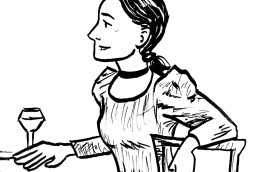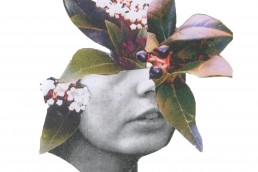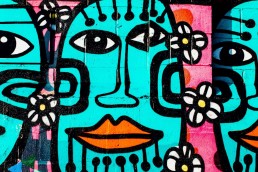By Fotoula Adrimi
Photography by Jonathan Pendleton, via Unsplash
Content Warning: discussions of emotional abuse
My cousin is sobbing, overcome by sadness. She is caught in a codependent relationship which, although not physically violent, is psychologically abusive. Her narcissistic partner has asked her to marry him and she could not find the power to say “no”. She feels trapped, unable to walk away. Part of her dreads this future, yet, it is as if she is being dragged along by a strong current that she has no power to withstand.
My cousin is not alone. In the therapy room, women in opposite-sex relationships often describe an abusive male partner by saying, “he’s not really a bad person”, usually followed by, “he had a difficult childhood”. They find excuses for inexcusable behaviour, ranging from self-centeredness, neglect, continuous degrading criticisms of their body, behaviour, to friendships with other women. In such relationships, the women’s needs are seldom met, whilst there is a high expectation that the needs of the partner should be fulfilled. Women develop unrealistic hopes that the relationship will ameliorate and their partner’s behaviour will change, despite mounting evidence to the contrary.
Most of the time narcissistic men in relationships with women refuse to change; the situation suits them. They believe they are at the centre of attention by right. If they ever consider a woman’s needs it is as if they are doing her a favour and it is only a temporary gesture. Unless they are prepared to look at their behaviour objectively, nothing will change.
We may wish to be fearless women. We may even be that, in the workplace or elsewhere. But how fearless are we in the pursuit of our happiness and an equal and respectful relationship? It takes a lot of inner work to find the power to stand up and claim our self-respect. It is not the gift of our partner to give. It is ours to claim.
When women undertake personal work, they often realise the traps of their behaviour: kindness that was taken for granted, a need to serve others in order to be accepted, repeating a familiar example of patriarchy from their own childhood. A partner who leans in this way behaves like a demanding child and the woman may have to take on the role of a mother.
A tendency towards codependency in a woman can start with an inner need for love, combined with an ideal of fairy-tale love. Some may have dreamt of a prince who is devoted, appreciative and loving, to heal a lack of love in our past. If we did not find love in our paternal home, perhaps a partner will rescue us from loneliness. Consequently, we project our need for love onto our partner, hoping that they will not reject it. This need creates the trap. We are so desperate for love that we do not realise we are with the wrong person. Even if we know the person is unsuitable, we may be too frightened to let the relationship go, fearful of being alone.
Many women find the impetus to make the change after they catch their partner cheating, lose their job, have an accident, or go through a serious illness. A question about what they really want in life arises in their mind. Having fallen so low, the only way is up.
Sometimes it takes a traumatic event to wake us up from the lethargy of our unhappy relationship. Many women find the impetus to make the change after they catch their partner cheating, lose their job, have an accident, or go through a serious illness. A question about what they really want in life arises in their mind. Having fallen so low, the only way is up.
Through personal work we start to appreciate and love ourselves. The question becomes “do I love/accept/appreciate myself enough to claim a life of happiness and truth?” And this question is difficult for women to answer affirmatively when there is a mortgage, financial security issues and children who may suffer from the breakup of an established family life. In these cases the alternative is a life of compromise and silence.
Women have been conditioned through centuries of patriarchy to put other peoples’ needs first. Religious doctrines have instructed women in their duty of obedience. Seeking happiness can be seen as selfish behaviour and in some faiths even a sin. These patterns are slow to dislodge and lead to unhappiness in relationships.
So how can we heal codependency? The first step is to realise that we have taken ourselves into this relationship, so we are the ones who can unravel it and find the path to inner freedom.
So how can we heal codependency? The first step is to realise that we have taken ourselves into this relationship, so we are the ones who can unravel it and find the path to inner freedom. It is not the fault of our partner. It is we who have compromised ourselves and settled for second best. We may wish our partner to change but this is another projection. What needs to change is our own thinking and approach.
So we embark on a journey of inner work, a journey of self-appreciation and self-exploration. In holistic medicine I found answers by tracking my own personal power. Following the break-up of my unhappy marriage, I trained in shamanic healing. Shamans talk about personal power as energy and life force. They say that when we concede to keep others happy, we give our power away, which in their view, creates depression, hopelessness and resentment. Long-term loss of power leads to a feeling of emptiness that we may use addictive substances to fill.
One of the traps that lead to power loss is thinking that our partner is better than us. To end this power game, we need to start to appreciate ourselves. In the shamanic belief, there is always one power that is inexhaustible and belongs to us: the spark of life, the inner essence, the light within, the radiance of our soul. This power is what keeps us hoping, dreaming and motivated. So to exit the unhealthy spiral of codependency, in shamanism we walk a different path, uncharted as it may be: the path revealed through the whispers of our soul. We start a relationship with the person that matters most in our life and will be with us always: our own self.
Fotoula Adrimi
Fotoula Adrimi, holistic life coach, shamanic teacher and clinical hypnotherapist, shares her therapeutic experience in helping women tackle issues of unworthiness and low expectations that lead to self-destructive, co-dependent relationships. She also shares teachings on working in ceremony to heal power games in relationships, and techniques on how to develop a relationship with the inner self, in her book, The Golden Book of Wisdom – ancient spirituality and shamanism for modern times.
Originally a town planner from the Sorbonne University, in 2005 Fotoula answered a soul calling by training in holistic healing and personal development. In 2013 she founded The ISIS School of Holistic Health in Glasgow, and has just published: “The Golden Book of Wisdom: ancient spirituality and shamanism for modern times”.








